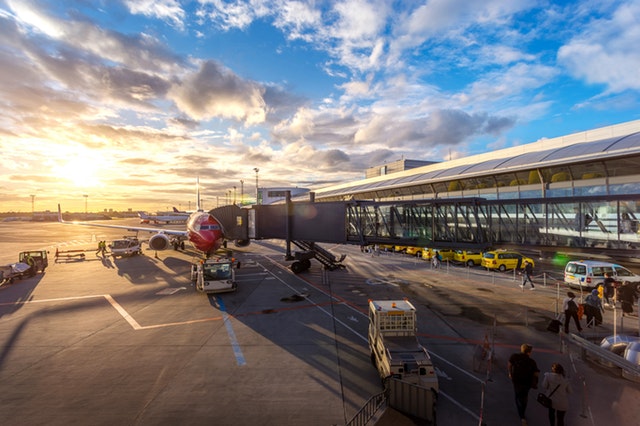The World Tourism Organisation has estimated that by 2030 a global population of 8.5 billion people will take approximately 2 billion international trips, necessitating the transportation industry to come up with ways
and means to make this happen.
Along with the movement of people, there is movement of goods too,requiring faster planes, increased cargo hold capacities, cold storage and automation, etc. The transformation of the cargo landscape is impressive.
Technology is playing a key role in this massive shift. Information technology has been a disruptive force ,
encompassing all sectors. Smartphones, artificial intelligence (AI), robotics, block chain technology, digital
payments, social media and the like have been impacting businesses (whether it is manufacturing or service) all over the world. The air cargo industry is no exception to the transformational changes that are taking place.
Blockchain holds promise
In the air cargo sector, Blockchain technology holds enormous promise. It is a way of bringing about transparency of all documents and transactions across the freight corridor, thereby, enhancing efficiency, agility and innovation of supply chains.
Blockchain technology is said to be a game-changer, helping speed-up the process of movement of goods,
simplifying the currently complicated system marred with bureaucracy.
Currently, many logistics organisations are faced with the problem of a single source of truth to store and track al ltransactions and those involved in the operations
According to GlobalTranz, Blockchain is a distributed ledger that digitally records transaction history between parties. Information gets stored in blocks of data that are ‘chained’ together. Each data block added to a chain is date stamped,unique and encrypted, which makes it unalterable. Information in a Blockchain cannot be hacked or counterfeited and is immediately ‘trusted’ and therefore, accepted by anyone with access to the chain.
Blockchain has tremendous potential anda few big Indian companies such as Mahindra Logistics and JM Baxi Group have tied-up with IBM to develop Blockchain technology.
These companies understand the importance of Blockchain technology as it enables smart contracts between players automating the processes of purchases, cutting time and cost, very crucial in the transportation sector.
Pirojshaw Sarkari, CEO of Mahindra Logistics, has said in the media how different units of the Mahindra Group
have synergised.
“There are auto component manufacturers, who are supplying to Mahindra’s auto division; Mahindra
Finance is financing them and Mahindra Logistics is picking up goods from the auto component vendors and delivering to Mahindra’s automotive division. The vendors get paid only once the products get delivered. When we pick parts, how are we to check whether they have a proper business? Blockchain helps us authenticate faster,” he said
More importantly, Blockchain helps in checking frauds and cargo thefts whichare fairly common in the supply-chain industry.
Warehouse automation
Automation is the buzzword. In the supply-chain industry, warehouses are getting a huge facelift, keeping abreast of times. The warehouses are getting automated and sorting, picking, palletisation, packing, delivery etc are done less manually.
The warehouses are becoming efficient, less cluttered and importantly there is inventory management that is good for business. Though not all work in warehouses need to be automated,there are aspects which make business sense and they include transporting picked items (conveyor built is one, robots also come in play); sorting (getting the order and sequence of items); packaging (getting the right size is important) and
delivery.
According to Ernst & Young and the CII (Confederation of Indian Industries) Institute of Logistics, warehousing in India has evolved into a complete logistics friendly infrastructure system and the industrysize is chalked at about $8 billion.
The warehousing sector is growing at a rate of 10 per cent per annum and within this, the warehouses catering to industrial and retail clients claim the maximum share of 55 percent.
With automated vehicles doing loading, unloading , stacking up etc in warehouses, then there are machines which seal the goods, print and apply carrier labels and locate it for delivery.
The warehouses are state-of-the-art with complete supply chain management. The features of most
warehouses include pick and pack; cross docking; repacking; real-time inventory visibility; just-in-time deliveries; order fulfilment; Reach trucks and Stackers; packing machines; forklifts for bulk area and container loading and unloading; warehouse management software;broadband internet connectivity and more.
Some of the companies that have shown the way of modern supply chain and logistics include Safeexpress; Agarwal Movers and Packers; Jeena; Activair Airfreight; Global Air Cargo logistics and many more, besides the world players such as DHL; Panalpinaand so on.
The scale of each of them is growing, for instance Safexpress has a very large network of offices (567 destinations) and vehicles(over3,600). It has over6 million square feet of warehousing space and it continues to expand.
Logistics companies have started understanding the value of automation.The Vice President (Marketing) of
Safexpress Vineet Kanaujia has stated that the focus will be on establishing centralized ware houses wit h
investments in technologies.
Safexpress is banking on artificial intelligence for its next level of growth. So far, it has created 32 logistics parks in Hyderabad, Manesar, etc., and has a roadmap for more futuristics logistics hubs in smaller towns such as Coimbatore, Siliguri etc. A report by CBRE mentions that regions such as Gurgaon,Chennai, Hyderabad, Pune and Kolkata are witnessing launch of large scale supply in the
warehousing and logistics space.
Another company which has set a scorching pace for others to catch up is Blue Dart, India’s most innovative and
awarded express delivery company. It has logistics network covering over 35,000 location and reaching 220
countries through DHL.
Blue Dart caters to the Express Logistics industryfor B2B and B2C, one of the most preferred third party logistics service provider for banking, financial services, insurance, e-commere, automotive, life sciences and healthcare, consumer durables and electronics.
All the growth has been possible as Blue Dart invests substantially in state-of-the art technology to stay ahead of the game. Its latest aviation hub in Chennai where it parks its own dedicated six freighters is equipped for quicker turn around time and streamlined movement of goods.
Technology such as RFID (radio frequency identification) and GPS tracking systems are passé. Some of
them have started looking at the option of unmanned aerial vehicles or drones to do cargo deliveries but there are regulatory and other challenges that come into play.
AI holds key to growth
Already artificial intelligence has made significant forays in the domain.
Companies such as Grey Orange, iFuture have bagged several clients including Amazon, Flipkart etc which deploy their AI solutions. IFuture’s Arkrobot is doing wonders.
It is a breakthrough in automatic order fulfilment technology, suited for ecommerce and other industries.
Arkrobot offers solutions to clients ranging from start-ups to gigantic scale order fulfilment centres and automated warehouses. Speed and scale have become essence of businesses and AI is helping achieve that.
Away from technology, a business driver for air cargo that is fast changing logistics dynamics is e-commerce. There has been humongous growth of e -commerce the world over. It has transformed not just how businesses operate but also how consumerism has moved to a different level.
According to the International Air Transport Association (IATA), the global retail ecommerce sales were $2.3 trillion in 2017, having doubled in about 5 years time from $1.1 trillion in 2012. There is no letting up of the e-commerce trend.
E-Commerce driving force
The Asia-Pacific region is said to be the largest e-commerce market in the world
and China is leading the way with ecommerce sales valued at about $1.1 trillion. Japan and South Korea are the
next biggest e-commerce markets in Asia-Pacific region.
India’s e-commerce market is also expanding fast, though not like China or South Korea. It is estimated that India’s ecommerce market can grow more than fourfold to touch $150 billion by 2022, from $36 billion last year, thanks to the expanding middle-class base from 380 million in 2017 to 540 million.
The dominant players in the ecommerce segment are Amazon, Flipkart, Snapdeal, Jabong and few more. With these e-commerce players offering prompt and efficient delivery systems, the role of logistics, especially air cargo, has become critical to their businesses.E-commerce is revolutionising customer expectation and air cargo logistics.
IATA says while global air freight growth has moderated in 2018 after unusually strong growth in 2017, many indicators show that the air cargo market is fundamentally well positioned to sustain the growth momentum at or above the long-term trend.
In addition to underlying macroeconomic trends, strong growth in e-commerce will play an increasingly important role in air cargo markets. Generally, goods transported by air, such as time-sensitive perishables and high value commodities including computers, consumer electronics, and pharmaceuticals, are
some of the fastest-growing trade flows around the world.
While there are potential risks in the market, including trade tensions and volatile fuel prices, air cargo market
fundamentals remain favorable. In 2018, air cargo transport measured in revenue tonne-kilometers (RTK) is forecast to grow 4 percent and cargo revenue is expected to exceed $100 billion.











